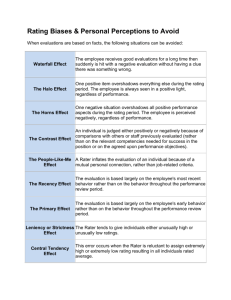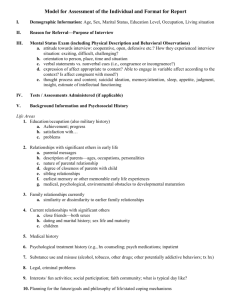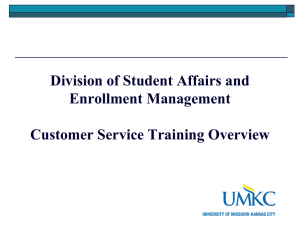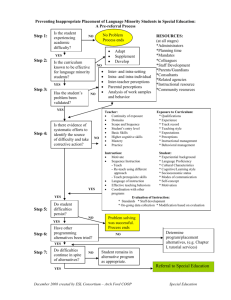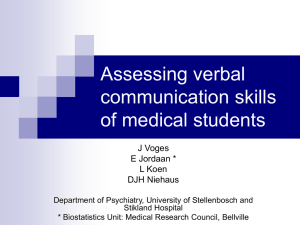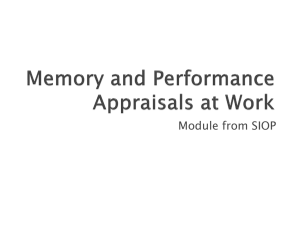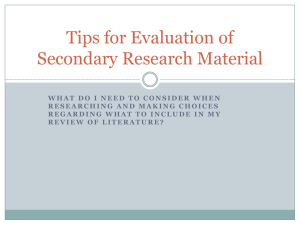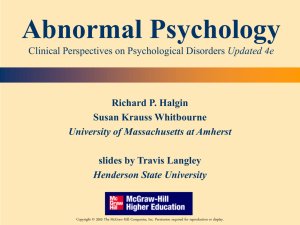Evaluations Descriptions in Alphabetical Order
advertisement
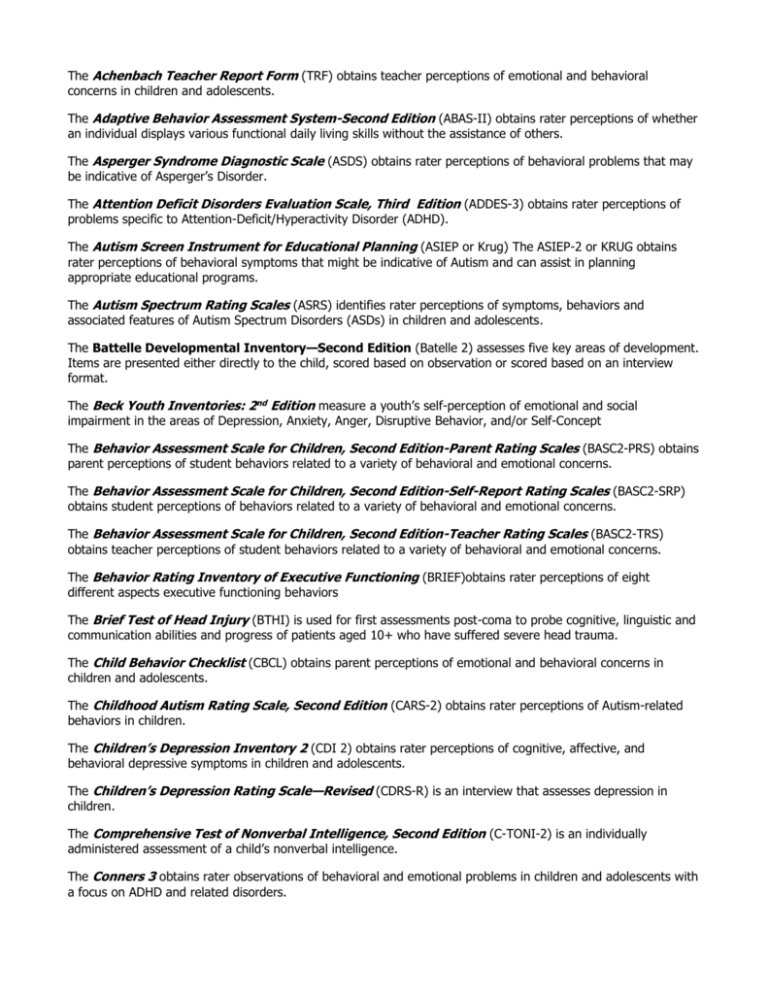
The Achenbach Teacher Report Form (TRF) obtains teacher perceptions of emotional and behavioral concerns in children and adolescents. The Adaptive Behavior Assessment System-Second Edition (ABAS-II) obtains rater perceptions of whether an individual displays various functional daily living skills without the assistance of others. The Asperger Syndrome Diagnostic Scale (ASDS) obtains rater perceptions of behavioral problems that may be indicative of Asperger’s Disorder. The Attention Deficit Disorders Evaluation Scale, Third Edition (ADDES-3) obtains rater perceptions of problems specific to Attention-Deficit/Hyperactivity Disorder (ADHD). The Autism Screen Instrument for Educational Planning (ASIEP or Krug) The ASIEP-2 or KRUG obtains rater perceptions of behavioral symptoms that might be indicative of Autism and can assist in planning appropriate educational programs. The Autism Spectrum Rating Scales (ASRS) identifies rater perceptions of symptoms, behaviors and associated features of Autism Spectrum Disorders (ASDs) in children and adolescents. The Battelle Developmental Inventory—Second Edition (Batelle 2) assesses five key areas of development. Items are presented either directly to the child, scored based on observation or scored based on an interview format. The Beck Youth Inventories: 2nd Edition measure a youth’s self-perception of emotional and social impairment in the areas of Depression, Anxiety, Anger, Disruptive Behavior, and/or Self-Concept The Behavior Assessment Scale for Children, Second Edition-Parent Rating Scales (BASC2-PRS) obtains parent perceptions of student behaviors related to a variety of behavioral and emotional concerns. The Behavior Assessment Scale for Children, Second Edition-Self-Report Rating Scales (BASC2-SRP) obtains student perceptions of behaviors related to a variety of behavioral and emotional concerns. The Behavior Assessment Scale for Children, Second Edition-Teacher Rating Scales (BASC2-TRS) obtains teacher perceptions of student behaviors related to a variety of behavioral and emotional concerns. The Behavior Rating Inventory of Executive Functioning (BRIEF)obtains rater perceptions of eight different aspects executive functioning behaviors The Brief Test of Head Injury (BTHI) is used for first assessments post-coma to probe cognitive, linguistic and communication abilities and progress of patients aged 10+ who have suffered severe head trauma. The Child Behavior Checklist (CBCL) obtains parent perceptions of emotional and behavioral concerns in children and adolescents. The Childhood Autism Rating Scale, Second Edition (CARS-2) obtains rater perceptions of Autism-related behaviors in children. The Children’s Depression Inventory 2 (CDI 2) obtains rater perceptions of cognitive, affective, and behavioral depressive symptoms in children and adolescents. The Children’s Depression Rating Scale—Revised (CDRS-R) is an interview that assesses depression in children. The Comprehensive Test of Nonverbal Intelligence, Second Edition (C-TONI-2) is an individually administered assessment of a child’s nonverbal intelligence. The Conners 3 obtains rater observations of behavioral and emotional problems in children and adolescents with a focus on ADHD and related disorders. The Conners Comprehensive Behavior Rating Scale (Conners CBRS–P) obtains rater observations of a wide range of behavioral, emotional, social and academic concerns and disorders in children and adolescents. The Conners Early Childhood (Conners EC) obtains rater observations of a wide range of behavioral, emotional, and social concerns, as well as developmental milestones in young children. The Das Naglieri Cognitive Assessment System (CAS) is a cognitive evaluation that assesses planning, attention, simultaneous processing and successive processing. The Delis Kaplan Executive Function System (D-KEFS) assesses difficulties in fundamental and higher level cognitive skills. The Developmental Assessment of Young Children (DAYC) is an observation, interview or direct assessment that measures five key areas of development. The Developmental Profile 3 (DP-3) obtains rater perceptions of development and functioning of children birth-12. The Differential Ability Scale-2 (DAS-2) is an individually administered test designed to measure a person's cognitive functioning and identify cognitive strengths and weaknesses. The Gilliam Autism Rating Scale (GADS) obtains rater perceptions of behavioral problems that may be indicative of Asperger’s Disorder. The Gilliam Autism Rating Scale—Second Edition (GARS-2) obtains rater perceptions of behavioral problems that may be indicative of autism. The Inventory for Client and Agency Planning (ICAP) is a rating scale that assesses the status, adaptive functioning, and service needs of individuals. The Leiter International Performance Scale – Revised (Leiter–R) is an individually administered nonverbal test of intelligence that assesses visualization and reasoning abilities are assessed without the use of verbal or written language. The Multi-dimensional Anxiety Scale for Children (MASC) is a self-report measure designed to assess symptoms of anxiety including physical symptoms, social anxiety, and harm avoidance. The Multiscore Depression Inventory (MDIC) is a self-report measure of childhood depression with items created by children. The NEPSY-II assesses cognitive functions not typically covered by general ability or achievement scales with intent to measure school-based behavior and/or learning problems to determine effective interventions and learning strategies. The Pervasive Developmental Disorder Behavior Inventory Screening Version (PDDBI-SV) is an abbreviated form of the PDDBI used for screening and obtains rater perceptions of several areas of development related to autism Spectrum Disorders. Behaviors are compared to other children already diagnosed with an Autism Spectrum Disorder. The Pervasive Developmental Disorders Behavior Inventory (PDDBI) obtains rater perceptions of several areas of development related to autism Spectrum Disorders. Behaviors are compared to other children already diagnosed with an Autism Spectrum Disorder. The Preschool and Kindergarten Behavior Scales (PKBS-2) obtains rater perceptions of social behaviors (and problem behaviors. The Preschool Behavior Checklist (PBCL) measures rater perceptions of behavioral and emotional difficulties in young children. The Preschool Behavioral and Emotional Rating Scale (PreBERS) obtains rater perceptions of a child’s social, emotional functioning and school readiness/involvement. The Psychoeducational Profile: Third Edition (PEP-3) is an individually administered measure of the skills and behaviors of children with autism and communicative disabilities with a developmental age between 6 months and 7 years. The Revised Children’s Manifest Anxiety Scale- 2nd Edition (RCMAS-2) is a self-report measure that assesses anxiety symptoms in children including the areas of physiological anxiety, worry, social anxiety, and defensiveness. The Reynolds Intellectual Assessment Scale (RIAS) is an individually administered test of verbal and nonverbal intelligence The Scales of Cognitive Abillity for Traumatic Brain Injury (SCATBI) tests adolescents and adults for cognitive deficits in areas that are frequently impacted when a head trauma is suffered. The Scales of Independent Behavior-Revised (SIB-R) obtains rater perceptions of daily living skills and selfhelp behavior. The Scales of Independent Behavior-Revised (SIB-R), Early Development Form obtains rater perceptions of overall functional independence and problem behaviors in young children. The Slosson Intelligence Test–Revised Third Edition (SIT-R3) is an individually administered screening test of Verbal Intelligence. The Social Competence and Behavior Evaluation (SCBE) obtains rater perceptions of social competence, affective expression, and adjustment difficulties. The Social Responsiveness Scale (SRS) obtains rater perceptions of the severity of autism spectrum symptoms in children and adolescents. The Social Skills Improvement System (SSiS) obtains rater perceptions of Social Skills and Problem Behaviors. The teacher report gives teacher perception of broad measure of Academic Competence. The Stanford Binet V (SB5) is an individually administered assessment of intelligence and cognitive abilities. The Test of Memory and Learning—Second Edition (TOMAL-2) is used to evaluate general and specific memory functions. The Test of Nonverbal Intelligence- Fourth Edition (TONI-4) is a non-verbal measure of intelligence, aptitude, abstract reasoning, and problem solving. The Test of Verbal Conceptualization and Fluency (TVCF) is an individually administered test used to assess multiple areas of executive functioning. The Universal Nonverbal Intelligence Test (UNIT) is an individually administered test of non-verbal intelligence. The Vineland Adaptive Behavior Scales, Second Edition (Vineland-II) obtains rater perceptions of daily living skills and self-help behavior. The Wechsler Abbreviated Scale of Intelligence (WASI) is an individually-administered abbreviated assessment of intellectual functioning. The Wechsler Adult Intelligence Scale—Fourth Edition (WAIS-IV) is an individually administered test of intelligence. The Wechsler Individual Achievement Test - Third Edition (WIAT-III) is an individually administered test used to assess academic achievement. The Wechsler Intelligence Scale for Children – Fourth Edition (WISC–IV) is an individually administered test designed to measure a person's intellectual functioning and identify cognitive strengths and weaknesses with a variety of verbal, abstract/visual, reasoning, processing, and memory tasks. The Wechsler Memory Scale – Fourth Edition (WMS–IV) is an individually administered assessment of adolescent and adult memory in the areas of immediate, delayed, and working visual and auditory memory. The Wechsler Nonverbal Scale of Ability (WNV) is an individually administered nonverbal measure of general intellectual functioning. The Wechsler Preschool and Primary Scale of Intelligence – Third Edition (WPPSI–III) is an individually administered test designed to measure young children’s intellectual functioning and identify cognitive strengths and weaknesses in the areas of verbal comprehension, perceptual organization, and processing speed abilities. The Woodcock Johnson Cognitive- 3rd Edition (WJC III) is an individually administered test of intelligence. The Young Children’s Achievement Test (YCAT) is an individually administered measure of early academic functioning for children between 4 years and 7 years 11 months old.
